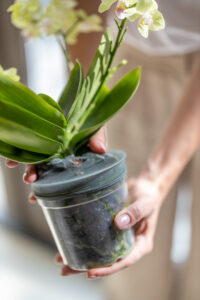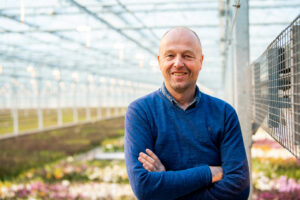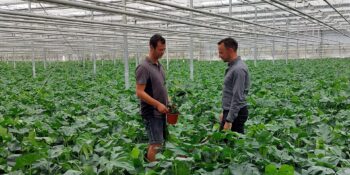A fully circular greenhouse in 2030. A lofty ambition but one they have set their sights on at Ter Laak Orchids. “We set the sustainability bar high,” says André van ’t Hoog, Crop Research and Quality Coordinator for the internationally active Phalaenopsis grower. “We don’t want to just stand back but anticipate what lies ahead.”
At Ter Laak, around 9 million Phalaenopsis plants leave the greenhouse every year. Production is spread over two sites: 4.5 hectares for the 9 cm pots and concepts, and 13 hectares for the 12 cm pots, multiflora and midi flora. These plants then find their way to customers throughout Europe.
 Pot worm stuck in innovative web
Pot worm stuck in innovative web
Sustainability plays a crucial role in the production process. We are constantly looking for creative solutions. For the dreaded pot worm, for example, which can cause a lot of damage to roots, leading to production loss. A lot of research has already been carried out but there are virtually no effective biological means available.
“You can cover the plants with special insect netting. This keeps the pot worm at bay but also results in reduced growth.” In collaboration with two fellow growers, Ter Laak has come up with a solution: potweb. “Using potweb you only cover the top of the pot. The mosquito is no longer able to deposit its eggs in the substrate and you retain light for the plants. In addition, you prevent roots from growing from one pot to another, which can lead to root overcrowding, and the bark no longer falls out of the pot.”
Setting the bar high for disease-free cultivation
The pot worm is not the only threat to Phalaenopsis cultivation. “Thrips are also a problem. We do use predatory mites, but they can’t kill all the thrips.” Much research is still needed but fortunately other options are available. “To keep thrips at bay as far as possible in the young plants, we have affixed gauze to the vents. If it proves satisfactory, we will look into whether this can be extended to other departments using insect screens in the vents. We are also rigorous with incoming plant material. We set the bar high: for ourselves but also for suppliers of plant material. This provides a greater chance for us to remain disease-free and enhances the quality of our starting material.”

André van ’t Hoog, Crop Research and Quality Coordinator
Fully circular in 2030
At Ter Laak, they have set themselves the target of being fully circular in 2030. A lofty ambition they intend to realise one step at a time. “Our first goal is to have chemical-free production,” explains Van ’t Hoog. “We want to minimise our environmental impact but maintain quality. To achieve this, we are running tests using biostimulants and natural predators. Together with suppliers we are getting a little closer to our goal all the time.”
Another key target is recirculation. In 2027, growers will no longer be permitted to discharge waste water and so it is now a matter of taking a closer look at recirculating fertilisers. “We also intend to produce as little waste as possible. We are carrying out tests using recycled pots and taking a critical look at our packaging.”
Working with colleagues
These sustainability challenges are tackled within the company by a specially appointed innovation and sustainability manager. However, joining forces with colleagues in the sector is also important. “This involves fellow orchid growers, but we also exchange a lot of knowledge with, for example, chrysanthemum, kalanchoe and gerbera producers. We get occasional visits to our company from politicians, and we tell our story about what we are doing in the area of sustainability and any issues we encounter. Our motto is: “don’t stand back but anticipate what’s ahead.”
 Playing in the Champions League
Playing in the Champions League
“You yourself can set the bar high,” continues Van ’t Hoog “but it is important that you also have a neutral, external partner who can validate that you are doing well. MPS is this partner for us. If necessary, they can point out things we can do even better.”
Using assessments such as those of MPS, growers can see how their company is developing. “This way you can also do a comparison with fellow growers in terms of environmental impact and the like.” It’s almost a kind of football competition, even though it’s not really a rivalry. “We want to play in the Champions League, i.e., at the highest level, but ultimately cooperation is the most important aspect. Fortunately, the partnership with MPS is excellent and other Phalaenopsis growers are also open to taking concerted action and making the horticulture sector even stronger.”



